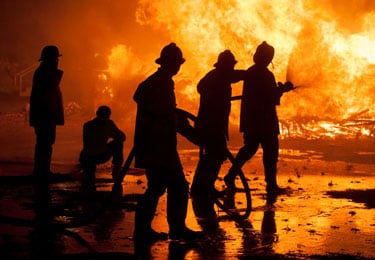Firefighter Resources, Cancer and Other Illnesses

Cancer and Other Illnesses
Cancer
Highlight
Join the National Firefighter Registry (NFR) for Cancer today! The NFR is the largest existing effort to understand and reduce cancer risk among firefighters. All U.S. firefighters, with or without cancer, can join. Visit the NFR website to learn more.
Firefighter Cancer Study
In 2010, NIOSH researchers, with funding assistance from the U.S. Fire Administration launched a multi-year study to examine whether firefighters have a higher risk of cancer and other causes of death due to job exposures. Our study was designed to address limitations of previous firefighter cancer research.
- With more than 30,000 career firefighters who served in Chicago, Philadelphia, and San Francisco Fire Departments between 1950 and 2010, it is the largest study of United States firefighters ever undertaken. In addition, both non-white and female firefighters are represented.
- We looked not only at deaths from cancer, but also at the diagnosis of certain kinds of cancer, such as testicular and prostate cancer, which have higher survival rates. We also examined other causes of death to better understand the risk for various cancers and illnesses among firefighters compared to the general public.
- We examined more exposures than previous studies. We looked at the number and type of fire runs made (for example, EMS and vehicle fire) and the use of personal protective equipment and diesel exhaust controls.
Publications
- Mortality in a cohort of US firefighters from San Francisco, Chicago and Philadelphia: an update (2020)
- Creation of a retrospective job-exposure matrix using surrogate measure of exposure for a cohort of US career firefighters from San Francisco, Chicago and Philadelphia (2015)
- Exposure-response relationship for select cancer and non-cancer health outcomes in a cohort of US firefighters from San Francisco, Chicago and Philadelphia (1950-2009) (2015)
- Mortality and cancer incidence in a pooled cohort of US firefighters from San Francisco, Chicago and Philadelphia, 1950–2009 (2013)
- NIOSH study of firefighters finds increased rates of cancer, NIOSH Update (2013)
- NIOSH firefighter cancer study initial result, Frequently Asked Questions (2013)
- Cancer incidence among male Massachusetts firefighters, 1987–2003 (2008)
- Mortality in Florida professional firefighters, 1972 to 1999 (2005)
- Cancer incidence and general mortality in a cohort of Florida firefighters (2003)
- Mortality among firefighters: A 27 state survey (1994)
Heart Disease
Heart Health Risk for Firefighters
- Sudden death from a heart event is the most common cause of death among firefighters (Preventing firefighter fatalities, 2007).
- Most heart disease can be prevented.
Publications
- NIOSH Firefighter Fatality Investigation Reports: Cardiac events
- Preventing firefighter fatalities due to heart attack and other sudden cardiac events, NIOSH Alert, No: 2007-13 (2007)
- Firefighter wellness regime (2011)
- Physiological recovery from firefighting activities in rehabilitation and beyond (2011)
- Cardiovascular risks in firefighters: Implications for occupational health nurse practice (2004)
- Heart problems, mental health, and job stress in the Anaheim Fire Department, Health Hazard Evaluation Report: No 94-0390-2822 (2000)
- Correlates of fitness for duty in hazardous materials firefighters (1999)
Hearing Loss
Preventing Hearing Loss
- NIOSH recommends workplace noise levels are below 85 dBA (8-hour time-weighted average of 85 dBA based on a 3-dB exchange rate).
- NIOSH provides standards to help prevent workplace hearing loss, Criteria for a Recommended Standard: Occupational Noise Exposure
- Routine fire fighting tasks and emergency response activities often result in noise exposure that exceeds NIOSH recommendations.
- Repeated exposure may gradually cause work-related hearing loss.
- To prevent hearing impairment among firefighters, we recommend using engineering and administrative controls to limit overall exposure to noise.
- When controls are not possible, we recommend hearing protection training and limiting noise exposures.
Publications
- Time-weighted averages and firefighter hearing loss (2004)
- Noise and hearing loss in firefighting (1995)
- Hamilton Fire Department, Hamilton, OH (hearing loss), Health Hazard Evaluation Report: No 89-0026-2495 (1995)
- Pittsburgh Bureau of Fire, Pittsburgh, PA (hearing loss), Health Hazard Evaluation Report: No 88-0290-2460 (1994)
- International Association of Firefighters, Anaheim, CA (hearing loss), Health Hazard Evaluation Report: No 87-352-2097 (1991)
- Memphis Fire Department, Memphis, TN (hearing loss), Health Hazard Evaluation Report: No 86-138-2017 (1990)
- International Association of Firefighters, Cincinnati, OH (hearing loss), Health Hazard Evaluation Report: No 84-454-1890 (1988)
Rhabdomyolysis
Preventing Rhabdomyolysis among Firefighters
- Rhabdomyolysis (often called rhabdo) is the breakdown of muscle tissue and has many causes including heat exposure, high core body temperature, and prolonged, intense exertion
- Early treatment can prevent serious medical problems.
- If not quickly identified and treated, rhabdo can result in:
- Death
- Kidney failure requiring lifelong kidney dialysis or a kidney transplant
- Permanent disability
- Routine firefighter tasks, such as carrying extra weight of equipment and working in hot environments, may increase firefighters’ risk for rhabdo
Publications
Structural Firefighters
- What Structural Firefighters Need to Know about Rhabdomyolysis
- Wallet Card to notify healthcare providers of structural firefighters’ increased risk for rhabdomyolysis (PDF attached)
Wildland Firefighters
- What Wildland Firefighters Need to Know about Rhabdomyolysis
- Wallet Card to notify healthcare providers of wildland firefighters’ increased risk for rhabdomyolysis (PDF attached)
Medical Professionals
Other Illness – Publications
- Fatality Investigation Reports
- Tuberculin skin test conversions at a Mississippi fire department, City of Meridian Fire Department, Health Hazard Evaluation Report: No. 2007-0012-3046 (2007)
- Particle size-dependent radical generation from wildland fire smoke (2007)
- Acute respiratory effects of smoke exposure in wildland firefighters (NORA Symposium 2006)
- Single nucleotide polymorphisms (SNPs) associated with decline in lung function in firefighters (Research Symposium 2006)
- Acute respiratory effects of smoke exposure in wildland firefighters (2005)
- Blood-borne pathogens among firefighters and emergency medical technicians (2005)
- Adverse respiratory effects following overhaul in firefighters (2001)
- Neurodegenerative diseases: occupational occurrence and potential risk factors, 1982 through 1991 (1996)
- International Association of Firefighters (IAFF), Sedgwick County, KS (heat stress) Health Hazard Evaluation Report: No 90-0395-2121 (1991)
